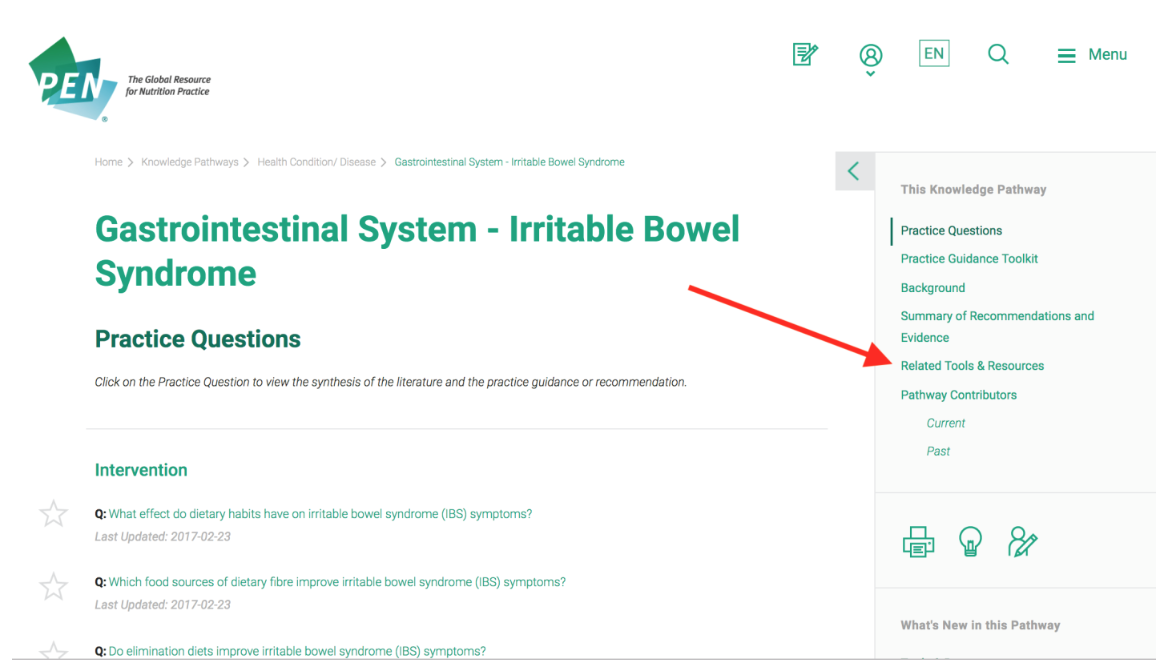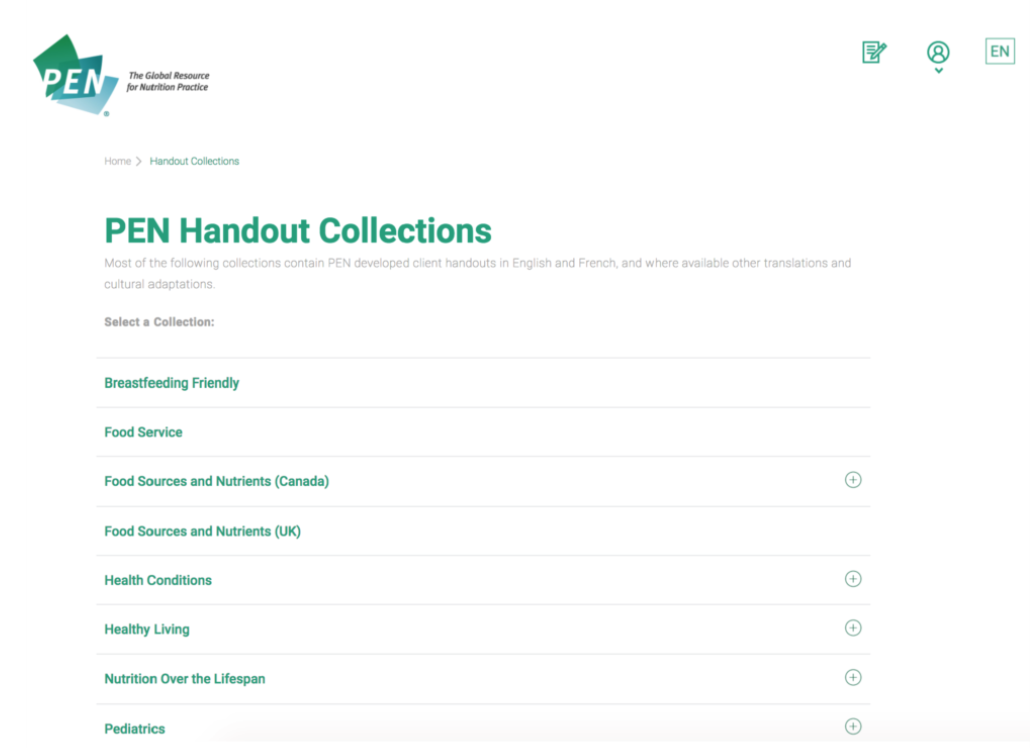PEN eNews 10(12) December 2020
PEN
® eNews is a monthly e-newsletter shared with the global PEN Community and created to help dietitians position themselves as leaders in evidence-based nutrition practice. In addition, users of the PEN System will find articles on the new evidence, resources and features available and how to maximize one's use of PEN.
Peanut Oral Immunotherapy - What is the Latest?
The Question
What is the efficacy and safety of peanut oral immunotherapy for the treatment of peanut allergy in children?The Recommendation
Peanut oral immunotherapy (POIT) involves incremental controlled exposure to peanut allergen (predominantly using defatted lightly roasted peanut flour) with the goal of reducing allergic reaction by desensitization.
The current knowledge on POIT suggests that it could potentially be a promising option for individuals with peanut allergies with the majority of participants achieving the research endpoint of desensitization (passing an in-clinic oral food challenge). However, this does not translate to less out-of-clinic reactions. Further, compared to allergen avoidance, POIT increases the risk and frequency of allergic reactions, anaphylaxis, the need of epinephrine and serious adverse events, rather than preventing them as intended.
The significant concerns regarding risks and side-effects, including potentially serious reactions requiring medications or epinephrine, lead to caution regarding the adoption of POIT in clinical practice outside of trial settings.
To see the full practice question, including the Evidence Summary, Remarks, Evidence Statements, Rationale and References, click here.
Want to know what else is new and updated? Bookmark these pages:
New Knowledge Pathway Content
(Knowledge Pathways, Practice Questions, Summary of Recommendations and Evidence, Practice Guidance Toolkits, Backgrounds)
Tools and Resources.
The Prostate Cancer Knowledge Pathway was just updated
Do you know the answer to these questions?
- Is tomato consumption associated with a decreased or an increased risk of prostate cancer?
- Is alcohol intake associated with a decreased or an increased risk of prostate cancer?
- Is folate supplementation recommended for men with prostate cancer?
- Should men with prostate cancer follow a Mediterranean diet?
- What is the role of flaxseed in prostate cancer?
For answers to these questions and for more information, see the links below:
Looking for more information related to cancer? There are:
- 10 Knowledge Pathways
- 88 Practice Questions
- 194 Handouts
Enter the search term “cancer” in the PEN Search and check out the results!
Menopause and Nutrition – Are you Up-to-Date?
Have you looked at the Women’s Health - Menopause Knowledge Pathway lately? Three practice questions were just updated:
And there are more on the way!
Looking for a quick way to view the recommendations and evidence? Check out:
Wondering about tools and resources on menopause and nutrition, including client handouts? See the Related Tools & Resources.
Open Access to COVID-19 Content Continues
Although the Open Access to the entire PEN® System is now closed, we continue to make COVID-19 information, Trending Topics and PEN® eNews available to all with no PEN subscription or access credits required:
If you are interested in continuing your access to the entire PEN System and you are not a current subscriber, please view the different subscription options available at:
https://www.pennutrition.com/signup.aspx. Revenue from PEN subscriptions is reinvested in the system to keep the content up-to-date and constantly growing while positioning you on the leading edge in your practice. The PEN System does not accept industry revenue or advertising.
We hope you'll be an active member of our PEN community and stay connected with us:
Stay Safe,
The PEN Team
Surprising Findings: NutriGrading the evidence - Does it stack up?
As a new PEN Evidence Analyst, there is always more to learn about the how to critically review evidence. I was recently updating a practice question when I came across an assessment tool to evaluate the quality of evidence of meta-analyses that I was not familiar with called NutriGrade. While I was aware of GRADE, I was surprised to read about NutriGrade and was intrigued to learn more!
NutriGrade is an adaptation of the GRADE system modified for the field of nutrition research (1). While many of the assessment criteria between the two tools are the same, NutriGrade has developed criteria intended to better judge the unique features and outcomes of nutrition studies not addressed in GRADE such as the: methodological challenges inherent in nutrition study designs (e.g. lack of blinding, having a true placebo and crossover bias), dietary assessment methods and tools and their validation (e.g. dietary records, food frequency questionnaires), diet-associated surrogate biomarkers and funding bias. Cohort study designs, which NutriGrade developers felt were undervalued and underscored in GRADE, are weighted higher. After a lot of testing and refining, the developers ended up with a seven-item tool for RCTs and an eight-item tool for cohort studies that could assess and score the quality of evidence from meta-analyses. Items in NutriGrade include risk of bias, study quality and study limitations, precision, heterogeneity, directness, publication bias, funding bias, study design, effect size and dose-response. For each item, well-defined criteria were developed.
Another unique feature of NutriGrade is that a 10-point scoring system to quantify and grade the quality of evidence was developed, which is then further divided into four categories of confidence similar to GRADE (1). A grading score of 8-10, reflects a “high” level of confidence; 6 to 7.99 suggests a “moderate” level, 4 to 5.99 is a low confidence and 0 to 3.99 reflects a very low level of confidence in the certainty of the evidence. Internal validity was tested and excellent agreement and reliability between independent raters and their overall NutriGrade scores was found when 30 meta-analyses were compared.
In terms of reliability, when GRADE and NutriGrade were compared, good reliability between the two tools for RCTs was found, but NutriGrade ranked the same cohort studies higher, which is not surprising given the additional weight that NutriGrade gives to cohort studies (1,2). Since publication of this work, it is interesting to note that GRADE has integrated an approach that permits better comparison of evidence from RCTs and nonrandomized studies (3).
My investigation of these two approaches brought me to my second surprising finding. While the name implies that NutriGrade is like a cousin to GRADE, it has not received the same “Gold Star” recognition. It has not been endorsed by GRADE and there is hefty academic discourse on the merit and need for NutriGrade. While the developers suggest that NutriGrade better assesses the unique feature of nutrition-based studies (1,4), the proponents of GRADE argue that it has been used successfully to do so (2). As I continue my learning in the field of evidence-based research, I will be curious to learn how this debate proceeds and what the future of NutriGrade will be.
Written by:
Christine Mehling MSc, RD
PEN Evidence Analyst
References
- Schwingshackl L, Knüppel S, Schwedhelm C, Hoffmann G, Missbach B, Stelmach-Mardas M, ert al. Perspective: NutriGrade: A Scoring System to Assess and Judge the Meta-Evidence of Randomized Controlled Trials and Cohort Studies in Nutrition Research. Adv Nutr. 2016 Nov 15;7(6):994-1004. doi: 10.3945/an.116.013052. Erratum in: Adv Nutr. 2017 Mar 15;8(2):399. PMID: 28140319; PMCID: PMC5105044. Abstract available from https://pubmed.ncbi.nlm.nih.gov/28140319/
- Meerpohl JJ, Naude CE, Garner P, Mustafa RA, Schünemann HJ. Comment on "Perspective: NutriGrade: A Scoring System to Assess and Judge the Meta-Evidence of Randomized Controlled Trials and Cohort Studies in Nutrition Research". Adv Nutr. 2017 Sep 15;8(5):789-790. doi: 10.3945/an.117.016188. PMID: 28916579; PMCID: PMC5593107. Abstract available from: https://pubmed.ncbi.nlm.nih.gov/28916579/
- Schünemann HJ, Cuello C, Akl EA, Mustafa RA, Meerpohl JJ, Thayer K, et al; GRADE Working Group. GRADE guidelines: 18. How ROBINS-I and other tools to assess risk of bias in nonrandomized studies should be used to rate the certainty of a body of evidence. J Clin Epidemiol. 2019 Jul;111:105-14. doi: 10.1016/j.jclinepi.2018.01.012. Epub 2018 Feb 9. PMID: 29432858; PMCID: PMC6692166. Abstract available from: https://pubmed.ncbi.nlm.nih.gov/29432858/
- Ali Mohsenpour M, Fallah-Moshkani R, Ghiasvand R, Khosravi-Boroujeni H, Mehdi Ahmadi S, Brauer P, et al. Adherence to Dietary Approaches to Stop Hypertension (DASH)-Style Diet and the Risk of Cancer: A Systematic Review and Meta-Analysis of Cohort Studies. J Am Coll Nutr. 2019 Aug;38(6):513-25. doi: 10.1080/07315724.2018.1554460. Epub 2019 May 29. PMID: 31140934. Abstract available from: https://pubmed.ncbi.nlm.nih.gov/31140934/
How Do I … Sort Through the PEN® System to Find Tools and Resources?
Here’s how to sort to find the tools and resources in the PEN System:
Go to any Knowledge Pathway of interest (example: Irritable Bowel Disease) and click on Related Tools and Resources on the right-hand side of the screen.

You can click on one or all three of the orange boxes (audience, country, language) to sort through the results and find the tools and resources you need:

Available options you can sort by:
- Audience: consumer or professional
- Country: Australia, Canada, Europe, Japan, Ireland, New Zealand, South Africa, United Kingdom, United States
- Language: English, French, Chinese, Gujarati, Hindi, Indigenous Australian languages, Japanese, NA Aboriginal native languages, NZ Maori, Pacific Island languages, Punjabi, South Asian, Spanish, Tamil, Urdu, Vietnamese, Welsh
You can also access all PEN-created consumer handouts through the PEN Handout Collection on the PEN home page:

After clicking on the handout collection icon you will be directed to a variety of collections. Each contains PEN-developed client handouts in English with most translated into French, and some are also available in other translations and cultural adaptations.

Here's an example of handouts available for the Reactive Hypoglycemia under the 'Health Condition' collection:

En - English Fr - French Sp - Spanish Pun - Punjabi Ch - Chinese Vi - Vietnamese
As always, we welcome your feedback.
PEN® Resource Managers:
Jane Bellman MEd, RD
Kerri Staden BSc, RD
jane.bellman@dietitians.ca
kerri.stade@dietitians.ca
Reposted from a previous eNews Article.
PEN eNews
December 2020 Volume
10 (12)
A Publication of the PEN® System Global Partners,
a collaborative partnership between International Dietetic Associations.
Learn more about PEN.
Copyright Dietitians of Canada
. All Rights Reserved.